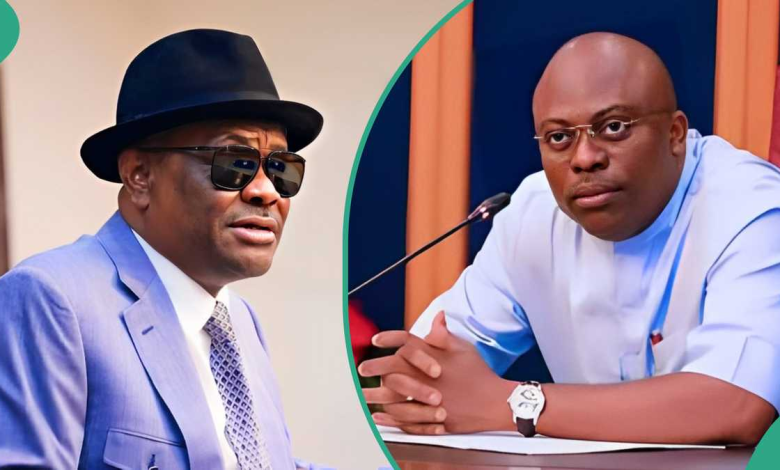How State of Emergency Affects Rivers People and Nigerians

By DAYO ADESULU
Tinubu’s State of Emergency in Rivers State Sparks Controversy
The political crisis in Rivers State has taken a dramatic turn as President Bola Ahmed Tinubu declared a state of emergency and appointed Vice Admiral Ibok-Ete Ibas (retd) as the sole administrator of the oil-rich state. The decision, which has sparked outrage and legal debates, follows months of political tension involving Governor Siminalayi Fubara and other state officials.
Why Was a State of Emergency Declared in Rivers State?
The crisis began with a rift between Governor Siminalayi Fubara and his predecessor, now Minister of the Federal Capital Territory (FCT), Nyesom Wike. The fallout led to political instability, including the defection of several state lawmakers from the Peoples Democratic Party (PDP) to the All Progressives Congress (APC) and the controversial impeachment attempts against Governor Fubara.
Despite efforts to mediate the crisis, including interventions from the Presidency, tensions escalated, resulting in the dissolution of the state House of Assembly and the removal of key government officials. The climax came when President Tinubu announced the state of emergency in Rivers State, citing threats to governance and security.
Appointment of a Sole Administrator for Rivers State
In an unprecedented move, Tinubu appointed Vice Admiral Ibok-Ete Ibas (retd) as the sole administrator of Rivers State. This decision has been met with mixed reactions, as many believe it undermines the constitutional powers of the elected governor.
- Afenifere Condemns National Assembly for Supporting State of Emergency in Rivers State
- https://www.thecheernews.com/aliko-dangote-foundation-extends-food-intervention-to-16-lgas-in-kwara/
Legal and Political Implications
The declaration of a state of emergency in Rivers State has raised serious legal concerns. The Nigerian Constitution (Section 305) allows the president to declare a state of emergency under extreme conditions, but critics argue that the current political crisis does not warrant such action. Legal experts warn that the move may set a dangerous precedent, giving the federal government undue control over state affairs.
How the Crisis Affects the People of Rivers State
1. Political Instability and Uncertainty
The suspension of elected officials and the imposition of a sole administrator create instability that may disrupt governance and public services. Residents fear that essential projects in infrastructure, education, and healthcare could suffer setbacks.
2. Economic Consequences
Rivers State is a major economic hub in Nigeria, especially due to its oil resources. The ongoing political crisis could discourage investors, leading to economic stagnation. Businesses dependent on government contracts may also experience financial strain.
3. Security Challenges
The uncertainty surrounding governance could fuel unrest and protests, raising security concerns. Political supporters of both factions may engage in violent clashes, further threatening the stability of the state.
Impact of Rivers State Crisis on Nigeria
1. Threat to Democracy and Federalism
The state of emergency in Rivers State raises concerns about democratic governance. If the federal government can remove an elected governor under controversial circumstances, it could weaken Nigeria’s federalism and embolden similar interventions in other states.
2. Legal Battles and Constitutional Interpretation
Opposition parties and civil society groups are likely to challenge the decision in court. The outcome of these legal battles will determine how much power the federal government can exercise over state affairs.
3. International Scrutiny
Nigeria’s political instability often attracts global attention. With civil society organizations reportedly petitioning the United Nations (UN), there is a possibility that the crisis could affect Nigeria’s international image and foreign investments.
Reactions to the State of Emergency in Rivers State
Political stakeholders have reacted differently to the development. While APC loyalists see Tinubu’s action as necessary to restore order, the PDP, human rights activists, and constitutional lawyers argue that it is unconstitutional and a power grab.
Governor Siminalayi Fubara’s Response
Governor Fubara has rejected the state of emergency, calling it an attempt to override the will of Rivers people. He has vowed to challenge the decision through legal means and has urged his supporters to remain peaceful.
Public Opinion
Many Rivers State residents have expressed concerns about the future of governance in the state. Civil rights organizations have warned that the decision could lead to massive protests if not handled carefully.
What Next for Rivers State?
As Nigeria watches closely, all eyes are on the courts and political negotiations that will determine the next steps. If the legal system overturns Tinubu’s decision, it could reinforce constitutional democracy. However, if it is upheld, it may embolden federal government interventions in state matters across the country.
Conclusion: The Future of Rivers State and Nigeria’s Democracy
The state of emergency in Rivers State is a significant political event with far-reaching implications. It is a critical test for Nigeria’s democracy, governance, and federalism. Whether through legal battles, political negotiations, or public resistance, the outcome will shape Nigeria’s political landscape for years to come.
#RiversStateCrisis, #StateOfEmergency, #Tinubu, #NigeriaPolitics, #DemocracyInNigeria, #Fubara, #Wike, #PoliticalCrisis, #NigeriaNews, #Federalism, #HumanRights,





